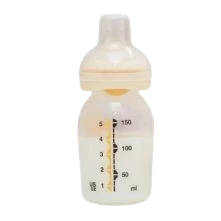Get A Quote
IS 14625 Plastic Feeding Bottles | BIS Process & Certification

Plastic feeding bottles designed under IS 14625 are specialized products intended for safe and hygienic feeding of infants. These bottles must be made from high-quality, non-toxic materials and are required to pass stringent safety tests for durability, temperature resistance, and hygiene. BIS certification under IS 14625 confirms that plastic feeding bottles meet these essential safety standards, ensuring that parents can confidently use them for infant feeding.
BIS Certification for Plastic Feeding Bottles
In India, BIS certification for plastic feeding bottles has been made mandatory under IS 14625 to ensure that these products meet specific health and safety requirements. This standard outlines guidelines for materials, manufacturing processes, and quality controls essential to avoid health risks associated with inferior or unsafe materials. The ISI mark granted through BIS certification signifies that the bottle has been tested and approved for safe use with infants, providing parents with an assurance of quality and safety.
Why is BIS Certification Necessary for Plastic Feeding Bottles?
BIS certification is vital for plastic feeding bottles due to the potential risks of using substandard materials in products for infants. Unsafe plastics can lead to chemical leaching, which may harm an infant’s health. BIS certification under IS 14625 ensures that feeding bottles are manufactured using non-toxic, durable, and temperature-resistant materials that comply with health standards, protecting infants from exposure to harmful chemicals. Certified products reassure parents of safety and reliability.
Overview of Indian Standard IS 14625
Indian Standard IS 14625 specifies the safety, quality, and material requirements for plastic feeding bottles. It ensures that bottles are made from food-grade, BPA-free, and non-toxic plastics to prevent chemical leaching. The standard mandates hygiene standards, making the bottles easy to sterilize and resistant to microbial growth. It also specifies durability and temperature resistance, ensuring bottles can withstand temperature changes without releasing harmful chemicals or degrading. Additionally, IS 14625 requires leak-proof designs to ensure safe and easy feeding, and clear labeling with usage instructions and material safety information.
Process for BIS Certification
The BIS certification process for plastic feeding bottles under IS 14625 involves multiple steps to ensure compliance with safety and quality standards:
Application Submission: Manufacturers submit an application with documentation, including material specifications and product design details.
Document Review: BIS reviews the submitted documents to verify compliance with IS 14625.
Factory Inspection: BIS officials conduct an inspection of the manufacturing facility to assess hygiene practices, quality control measures, and materials used.
Sample Testing: Product samples are tested in BIS-approved laboratories to confirm adherence to safety and quality parameters specified in IS 14625.
Certification Grant: Upon successful inspection and testing, BIS grants certification, allowing manufacturers to display the ISI mark on their plastic feeding bottles.
Documents Required for BIS Certification
To apply for ISI Certification for Plastic Feeding Bottles , manufacturers must provide the following documents:
● Completed application form
● Detailed manufacturing process information
● Quality control plans and test reports
● Factory layout and equipment details
● Product specifications and technical details
● Business registration proof
● Declaration of conformity to Indian standards
BIS ISI Mark Certification Costing And Timeline
To Know The Process in Detail, Please Visit:
Under BIS Registration Products ISI and CRS
Conclusion
BIS certification under IS 14625 for plastic feeding bottles is essential for ensuring product quality and safety in the infant care sector. Compliance with BIS standards confirms that these feeding bottles are manufactured using safe materials, are hygienic, and meet durability requirements. EVTL India offers expert support for manufacturers seeking BIS certification, guiding them through the application, testing, and approval process to ensure that their feeding bottles achieve market readiness with the trusted ISI mark.
Free Call Back
Latest News & Update
📅 BIS Critical Component List (CCL) Updates for Solar PV Modules
🕒 BIS Fee Concessions for MSMEs and Startups | EVTL India
📅 Guidelines for Implementation of Essential Requirements for Security of CCTV
🕒 Omnibus Technical Regulation (OTR) Amendment Order, 2025
🕒 Extension of Timeline for Filing Annual Returns by Battery Producers
📅 Extension of Timeline for Filing Quarterly and Annual Returns for E-Waste
🕒 Extension of Concurrent Running Period for IS 302-1: 2008 and IS 302 (Part 1): 2024
🕒 BIS Guidelines for Grant of Licence (GoL) | EVTL India
📅 CPCB Guidance on filing of Application, Fees and more
🕒 CPCB Notification on Labelling of Plastic Packaging
📅 Mandatory Compliance for Input Materials of Steel and Steel Products for Imports
🕒 BIS Guidelines for Scheme-X Certification for OTR-Regulated Products
📅 BIS Upgrades Product Certification License Numbers to 10-Digit Series
🕒 BIS Certification No Longer Mandatory for 14 Chemical & Polymer Categories
Why Choose EVTL INDIA
Expertise in Indian Regulatory Standards
End-to-End Support
Trusted by Top Indian & Global Brands
Fast Processing & Transparent Pricing
Strong Liaison with Indian Authorities
Company Profile















